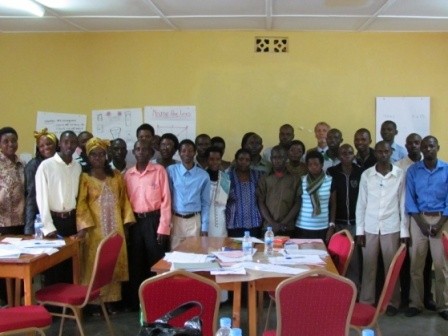
The year 2013 marked a number of achievements in Rwanda. First, the national airline announced its first female pilot. Then the World Bank ranked Rwanda as the third easiest economy to do business with in sub-Saharan Africa. The country is on a positive path.
These achievements would not have been possible without individuals with lightning-quick problem-solving, logic, and intelligent decision-making skills—all developed through mathematics, which begins in primary school.
"Rwandan children need these skills in order to compete in the regional and international economy," says Anathalie Nyirandagijimana, a curriculum developer. "Rather than simply learning to apply rules and perform mathematical tasks, children need to think mathematically."
Currently, primary school instruction does not emphasize these skills, which, unlike the Pythagorean Theorem, all children will make use of in their daily lives. Students may chant multiplication facts and solve equation after equation copied from the board, but never solve a problem that prepares them for solving the real problems they'll encounter in their business or other pursuits.
To better prepare students, USAID and the Rwanda Education Board hosted the country's first math camp in April 2013. It emphasized the use of mathematical investigations and placing problems in a real-life context. While typical math word problems ask students to use pre-learned methods to find the abstract, numerical answer, the mathematical investigations taught at the math camps do not tell students which method to use or what information is relevant in finding the answer.
In one mathematical investigation, seven people meet, and each person shakes hands with the others. Students must then determine the total number of handshakes and come up with their own method to find the answer. Then the teacher asks them to predict how many handshakes would occur if 20 people met, and so on, producing a general rule.
"Investigations help students to develop key skills such as choosing appropriate strategies, making predictions, thinking critically, and making logical arguments," says Nyirandagijimana.
The pilot camp, held over three days, included 30 teachers representing 20 schools in one of Rwanda's 30 districts. The math camps are built on three modules that can be delivered in workshop form over a few consecutive days or in short after-school sessions over several weeks—depending on the needs of a particular community.
Each teacher attending math camp created an action plan for incorporating the lessons into their teaching. Leonard Ndamyabera, a fifth-grade teacher at Bisusa School, said that he'll begin using investigations to help his students better understand mathematics.
"The investigation is very important because it helps the pupils to think and to discover some things, to solve the problems in their daily life," he said.
And one day, perhaps, it will help them to open their own businesses or fly their own planes.
Math camps are part of USAID's Literacy, Language and Learning (L3) project, implemented by the Education Development Center. The project, which began in 2011, seeks to improve early-grade literacy and numeracy skills of Rwandan children by enhancing the quality of teaching and learning materials across the country. The camps will be rolled out nationwide in primary schools as a part of the Rwanda Education Board's school-based mentoring program as well as in teacher training colleges before the project closes in 2016.







Comment
Make a general inquiry or suggest an improvement.